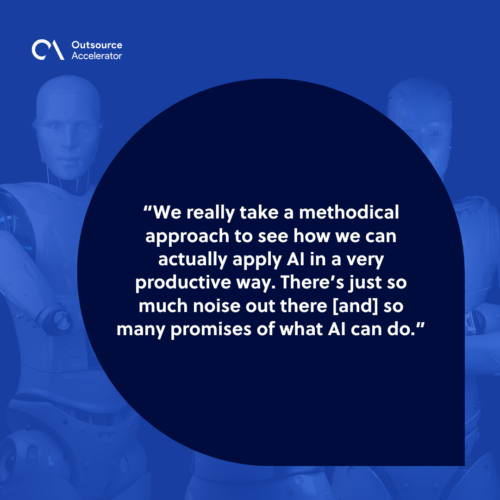What the future of AI in call centers means for customer experience

Call centers have long been at the heart of customer support, handling everything from technical troubleshooting to billing inquiries. But with the rapid rise of artificial intelligence (AI), these traditional service hubs are undergoing a major transformation.
AI in call centers is not only changing how businesses operate but also reshaping customer experience (CX) in profound ways.
As Matt Hall, founder and CEO of SolutionCX, noted in the 557th episode of the Outsource Accelerator Podcast, “Is it gonna destroy call centers? No. Is it gonna reduce or significantly change the call center of today? Absolutely. We’re always gonna need call centers.”
His insight highlights the reality: AI will not eliminate customer support, but it will redefine it.
In this article, we’ll explore the current role of call centers, how AI is being applied, what it means for customer experience, and what the future of AI-driven call centers may look like.
The current role of call centers in customer experience
Call centers remain a critical point of contact between businesses and customers. They handle millions of interactions daily, shaping the perception customers have of a brand.
- Responsiveness: Customers expect quick resolutions when they reach out for help.
- Human connection: Skilled agents provide empathy and personalized support, which builds loyalty.
- Consistency: Call centers ensure that customer issues are addressed uniformly, protecting brand reputation.
Yet, call centers also face significant challenges: high volumes of repetitive inquiries, rising labor costs, and the pressure to deliver around-the-clock service.
As Matt reflected, “The purpose of AI is to essentially remove or reduce your business’s biggest cost, and that is employment.”
This tension between operational efficiency and delivering great CX is where AI enters the picture.
How AI is changing call centers
The adoption of AI in call centers is accelerating, driven by the need to improve efficiency and customer satisfaction. Key applications include:
1. Automation of repetitive tasks
AI-powered systems can handle routine activities such as password resets, order tracking, or account updates. This frees human agents to focus on more complex issues that require empathy and judgment.
2. Chatbots and virtual assistants
Available 24/7, AI chatbots provide instant responses to common inquiries. They integrate with knowledge bases and customer data, ensuring consistent and accurate answers.
3. Predictive analytics and sentiment analysis
AI tools analyze customer history and communication patterns to predict needs and outcomes. Sentiment analysis can gauge a caller’s mood in real-time, allowing agents to adapt their tone and approach.
4. Intelligent call routing
Instead of waiting in long queues, customers can be directed to the best-qualified agent based on their inquiry and past interactions, improving efficiency and satisfaction.
Matt emphasized the importance of taking a structured approach: “We really take a methodical approach to see how we can actually apply AI in a very productive way. There’s just so much noise out there [and] so many promises of what AI can do.”

AI’s impact on customer experience
AI in call centers is already reshaping the customer journey in several important ways:
- Faster resolution times – Automated tools cut down wait times and deliver answers instantly.
- Personalized service – By leveraging customer data, AI helps tailor interactions to individual needs.
- Consistency across channels – Whether through phone, chat, or email, customers receive uniform responses.
- Enhanced agent performance – AI assists human agents with real-time suggestions, making them more effective.
At the same time, Matt warns against over-reliance on automation.
“The clients who do the best are those who have the capability to adapt, and I can’t stress that enough. If your business is adaptable and you as a business leader are adaptable, you’ve got an extraordinary future.”
In other words, companies must balance technology with human adaptability and empathy.
The future landscape of AI in call centers
The future of call centers will not be about machines replacing humans, but about humans and AI working together. Several trends are emerging:
Hybrid service models
Routine inquiries will increasingly be managed by AI, while human agents handle complex or emotionally sensitive issues. This balance ensures efficiency without losing the human touch.
Evolving role of agents
Agents will become problem-solvers and relationship-builders rather than script-followers. Their work will shift toward higher-value interactions supported by AI tools.
AI as a strategic enabler
Globally, Mckinsey reported that 78% of survey respondents used AI in their business. In the US, 96% of small business owners said they plan to further integrate new technologies.
Businesses that embrace AI early will gain competitive advantages in customer experience, cost savings, and scalability.

Continued demand for adaptability
As Matt put it, “AI is such an extraordinary opportunity, and we just all need to be able to learn and adapt and decide how to apply it.”
The organizations most likely to thrive will be those willing to evolve alongside the technology.
Adaptability for success with AI in call centers
AI in call centers is transforming the way businesses engage with customers. From automation and predictive analytics to chatbots and intelligent routing, AI promises faster, more personalized, and consistent customer service. Yet the heart of customer experience still lies in the human element.
As Matt noted, the key to success is adaptability—both for businesses and individuals.
Call centers are not disappearing; they are being reimagined. The future belongs to organizations that embrace AI thoughtfully, balance automation with empathy, and put customer experience at the center of every interaction.







 Independent
Independent




